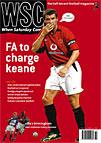 While fan violence may well be on the decrease, Mark Rowe says little can be read into the latest batch of arrest figures for the season just gone
While fan violence may well be on the decrease, Mark Rowe says little can be read into the latest batch of arrest figures for the season just gone
In what is becoming a pre-season tradition, the government and police recently unveiled football arrest figures for 2001-02 and proclaimed their policies are kicking hooligans out. Their headlines this time: arrests for football-related offences associated with Football League matches down by 30 per cent in the last ten years, despite bigger crowds; Premier League arrests also down; far fewer arrests at internationals; the vast majority of matches trouble-free.
Such facts about football disorder seemed to justify the Home Office minister John Denham on August 8 when he said: “I have no doubt that the increased number of banning orders, backed up by intelligence-based policing and effective co-operation between the police, clubs and the football authorities, has helped bring about the fall in football-related arrests at home and abroad.” In other words, the Football (Disorder) Act 2000 is working.
Let’s pass over the civil liberties aspects of the less well-known Football (Disorder) (Amendment) Act 2002, whereby police can seek a banning order against someone not even convicted of a football-related offence, but who their intelligence “suggests” is likely to cause trouble at a match. True, we did not hear of England hooligans at the 2002 World Cup. But we got the 2000 Act after the authorities from Tony Blair down had to waffle about getting tough after the Euro 2000 riots. England-related hooligans make headlines embar-rassing to Labour; punch-ups at some Third Division derby don’t.
The problem with the statistics is that most arrests happen away from grounds. The most obvious example is the rioting in Rotherhithe after Millwall’s May 2 play-off against Birmingham City. At a pre-season fans’ forum, Lewisham’s police commander Chief Supt Mike Humphrey admitted the situation got out of police control and apologised “if anyone was an innocent by-stander that got hit with a shield or a baton”. He also said: “Every game we will be out with cameras photographing people, because that is the best way to identify the people making trouble.”
Trouble-makers have reacted rationally to the security measures at stadiums – the in-creased numbers of stewards and police, and the presence of CCTV. So trouble happens much more often in car parks and pubs, and on the Tube and trains. Outnumbered police simply cannot arrest more than a handful.
Take recent incidents. August 2: about 200 fans cause trouble outside Boothferry Park before a friendly between Hull and Middlesbrough. Total arrests – one. August 10: a similar number of Sheffield United fans (whose coaches stopped on the way home from the Blades’ defeat at Coventry) and Derby County fans smash up a couple of Derby city centre pubs, and each other. Arrests – three Sheffield men. Meanwhile, seven Rams fans were arrested that afternoon at Pride Park as Derby played Reading. Does that mean the Pride Park trouble was seven times more serious than Hull? The statistics next August will say it was.
The police do admit that the figures do not always relate to reality: “Statistics for football-related arrests tell only part of the story and need to be placed in context. Some incidents, especially public disorder outside grounds, may result in few arrests…” But arrests are the only measure the authorities have to go on.
So where does that leave the law-abiding fan? Fairly safe inside the ground, especially in the Premier League where everything must be tickety-boo for the corporate prawn sandwich eaters and the media. Leave that stadium security “bubble”, however, and you’re in a situation rather like that at school, where the teachers used to keep some sort of order on the premises, only for the bully to beat you up halfway home.
How on earth can you land a banning order, and make it stick, on fans from City A who, returning from City B, have a ruck with fans from City C? It’s not a question the politicians are asking or the police can answer.
From WSC 188 October 2002. What was happening this month